June 2021 1st edition
June 2021 1st edition vuyelwan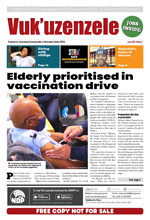
Translations
Jobs: Department of Justice and Constitutional Development - Jun 2021
Jobs: Department of Justice and Constitutional Development - Jun 2021 UrsulaDirector: Strategic Sourcing
Ref No: 21/126/CFO
Centre: National Office: Pretoria
Salary: R1 057 326 – R1 245 495 per annum. (All inclusive remuneration package) The successful candidate will be required to sign a performance agreement.
Requirements: A Degree/ National Diploma at NQF level 7 as recognized by SAQA in Commerce/ Business Economics/ Supply Chain Management/ Logistics Management/ Purchasing Management or equivalent qualification; 5 years experience at the middle / senior management level. Knowledge of Public Financial Management Act, PPPFA, Departmental Financial Instruction and Treasury Regulations; Knowledge of the Public Service environment; A valid driver’s licence.
Enquiries: Mr. J. Maluleke (012) 315 1090
Applications: Quoting the relevant reference number, direct your application to:
Email Address: DOJ21-126-CFO@justice.gov.za,
Director: Logistics And Acquisition Management, Ref No: 21/128/Cfo
Centre: National Office: Pretoria
Salary: R1 057 326 – R1 245 495 per annum. (All inclusive remuneration package) The successful candidate will be required to sign a performance agreement.
Requirements: An undergraduate qualification (NQF level 7) as recognized by SAQA in Financial Management, B-com in Finance; 5 years experience at the middle / senior management level. Knowledge of Public Financial Management Act, PPPFA, Departmental Financial Instruction and Treasury Regulations; Knowledge of the Public Service environment.
Enquiries: Mr. J. Maluleke (012) 315 1090
Applications: Quoting the relevant reference number, direct your application to:
Email Address: DOJ21-128-CFO@justice.gov.za,
Deputy Director: Supply Chain: Strategic Sourcing And Supplier Management
Ref No: 21/127/CFO
Centre: National Office, Pretoria
Salary: R733 257 – R863 748 per annum. (All inclusive remuneration package). The successful candidate will be required to sign a performance agreement.
Requirements: An appropriate Bachelors Degree/National Diploma in Commerce, Business Economics, Supply Chain Management, Logistics Management, Purchasing Management or equivalent qualification; 5 years experience in Supply Chain Management within the Public Sector; Knowledge of procurement and the broader public Supply Chain Management (SCM) legislative and regulatory environment.
Enquiries: Mr J. Maluleke ( (012) 315 1090
Applications: Quoting the relevant reference number, direct your application to:
Email Address: DOJ21-127-CFO@justice.gov.za
Office Manager
Ref no: 21/26/MAS
Centre: Office Of The Chief Master: Pretoria
Salary: R733 257 – R863 748 per annum. (All inclusive remuneration package). The successful candidate will be required to sign a performance agreement.
Requirements: An appropriate 3 years National Diploma/Degree in Public Administration or equivalent qualification (NQF level 6); 3 years relevant experience of which at least one year at management level; Knowledge of Performance Management System and Financial Management in the Public Service will be an added advantage; Knowledge of the Public Service environment; A valid driver’s licence.
Enquiries: Mr. S. Maeko (012) 315 1996
Applications: Quoting the relevant reference number, direct your application to:
Email Address: DOJ21-26-MAS@justice.gov.za
Deputy Director: Asset Management (Asset, Accounting, Verification & Reconciliation)
Ref No: 21/108/CFO
Centre: National Office, Pretoria
Salary: R733 257 – R863 748 per annum. (All inclusive remuneration package). The successful candidate will be required to sign a performance agreement.
Requirements: Bachelor’s Degree/National Diploma in Commerce, Accounting, Supply Chain Management, Financial Management or equivalent qualification at (NQF level 6); 3 years in Asset Management at supervisory/management level (ASD); Knowledge and proper understanding of the Asset Management Framework; Knowledge of Public Finance Management (PFMA), National Treasury Regulations and relevant prescripts; Practical knowledge of relevant reporting standards including IFRS
Enquiries: Mr J Maluleke (012) 315 1090
Applications: Quoting the relevant reference number, direct your application to:
Email Address: DOJ21-108-CFO@justice.gov.za
Senior Assistant State Attorney
(LP5-LP6): (03 POSTS)
Ref No: 21/102/SA: State Attorney: Nelspruit (01)
Ref No: 21/103/SA: State Attorney: Kimberley (01)
Ref No: 21/104/SA: State Attorney: Mahikeng (01)
Salary: R510 432 – R1 192 947 per annum. (Salary will be in accordance with OSD determination). The successful candidate will be required to sign a performance agreement
Requirements: An LLB or 4 year recognized legal qualification; Admission as an Attorney; At least 4 years appropriate post qualification legal/litigation experience; A thorough knowledge of legal practice, office management, accounting systems and trust accounts; The right of appearance in the High Court of South Africa; Knowledge of the government prescripts and transformation objective as well as the Constitution of South Africa; A valid driver’s licence.
Enquiries: Mr. E. Seerane (012) 315 1780
Applications: Quoting the relevant reference number, direct your application to:
Email Address: DOJ21-102-SA@justice.gov.za, DOJ21-103- SA@justice.gov.za And DOJ21-104-SA@justice.gov.za
Assistant Director: Third Party Funds
(Systems Control, Regulatory Management, Client Support & Training)
Ref No: 21/105/CFO
Centre: National Office, Pretoria
Salary: R376 596 – R443 601 per annum. The successful candidate will be required to sign a performance agreement.
Requirements: Bachelor’s Degree or National Diploma in Financial Management or equivalent qualification (NQF6), with Accounting as a major subject; Minimum of 5 years’ experience related financial environment of which 3 years at supervisory level; Knowledge of Public Financial Management Act (PFMA) and National Treasury Regulations; The following will serve as added advantages: Knowledge of departmental Third Party Funds systems and Departmental Financial Instructions (DFI); Knowledge of the Justice Administered Fund Act, Financial Instructions and Financial Directives as well as TPF SOPS; A valid driver’s licence.
Enquiries: Mr. J. Maluleke (012) 315 1090
Application: Quoting the relevant reference number, direct your application to:
Email Address: DOJ21-105-CFO@justice.gov.za
Closing Date: 31 May 2021
Tel: 012 315 1111 Private Bag X81, Pretoria, 0001 Momentum Centre, 329 Pretorius Street, Pretoria. www.justice.gov.za DOJCD_ZA DOJCD
NOTE: Interested applicants may visit the following website: www. justice.gov.za or www.dpsa.gov.za to view the full job specification of the above positions. Interested applicants must submit their applications for employment to the email address specified to each post. The email must include only completed and signed new Form Z83, obtainable from any Public Service Department or on the internet at www.gov.za, a CV with a font size of 10 and Arial theme font, copy of Identity Document, Senior Certificate and the highest required qualification as well as a driver’s licence where necessary. Attachments must be in a PDF format and limited to 10 megabytes. Emails that do not comply with the above specifications will bounce back without reaching the Department. Original/certified copies must be produced by only shortlisted candidates during the interview date. A SAQA evaluation report must accompany foreign qualifications. Applications that do not comply with the above mentioned requirements will not be considered. All shortlisted candidates for SMS posts will be subjected to a technical and competency assessment. A pre-entry certificate obtained from National School of Government (NSG) is required for all SMS applicants. Candidate will complete a financial disclosure form and also be required to undergo a security clearance. Foreigners or dual citizenship holder must provide the Police Clearance certificate from country of origin. The DOJ&CD is an equal opportunity employer. In the filling of vacant posts the objectives of section 195 (1) (i) of the Constitution of South Africa, 1996 (Act No: 108 of 1996), the Employment Equity imperatives as defined by the Employment Equity Act, 1998 (Act No: 55 of 1998) and relevant Human Resources policies of the Department will be taken into consideration. Reasonable accommodation shall be applied for People with Disabilities including where driver’s licence is a requirement. Correspondence will be limited to short-listed candidates only. If you do not hear from us within 3 months of this advertisement, please accept that your application has been unsuccessful. The department reserves the right not to fill these positions. Women and people with disabilities are encouraged to apply and preference will be given to the EE Target.
Jobs: Department of Justice and Constitutional Development - Jun 2021
Jobs: Department of Justice and Constitutional Development - Jun 2021 UrsulaSenior Family Advocate LP 9
Ref: 58/2021/FA/WC
Centre: Office Of The Family Advocate, Worcester
Salary: R983 019 – R 1 536 567 per annum. (Salary will be in accordance with OSD determination). (The successful candidate will be required to sign a performance agreement)
Requirements: An LLB Degree or recognised four (4) year legal qualification; At least eight (8) years appropriate post qualification litigation experience; Admitted as an Advocate; The right of appearance in the High Court of South Africa; A valid driver’s licence.
Enquiries: Advocate S Ebrahim (021) 426 1216
Applications: Quoting the relevant reference number, direct your application to:
Email Address: DOJ21-58-WC@justice.gov.za
Deputy Director: Quality Assurance
Ref No: 59/2021/WC
Centre: Regional Office, Cape Town
Salary: R733 257 – R863 748 per annum (All inclusive remuneration package). The successful candidate will be required to sign a performance agreement.
Requirements: A Bachelor Degree or three (3) year National Diploma in Public Administration or Equivalent qualification; Three (3) years’ managerial experience in office and district administration; A valid driver’s license.
Enquiries: Ms N Bekwa (021) 469 4000
Applications: Quoting the relevant reference number, direct your application to:
Email Address: DOJ21-59-WC@justice.gov.za
Deputy Director: Infrastructure Management (2 Posts)
Ref No: 21/134/CS
Centre: National Office, Pretoria
Salary: R733 257 – R863 748 per annum (All inclusive remuneration package). The successful candidate will be required to sign a performance agreement.
Requirements: A Degree/ National Diploma at NQF level 6 as recognized by SAQA in Built environment; Minimum of 5 years relevant experience of which 3 years should be at management level;Knowledge of National Building Regulation, Government Immovable Asset Management Act (GIAMA), Occupational Health and Safety Act, Public Financial Management Act (PFMA), Treasury Regulations and (Municipal Act, OHS Act; etc.); Technical knowledge in the spectrum of discipline within the Built Environment.
Enquiries: Ms M Kganyago (012) 315 1844
Applications: Quoting the relevant reference number, direct your application to:
Email Address: DOJ21-134-CS@justice.gov.za
Court Manager
Ref No: 2021/68/GP
Centre: Magistrate Boksburg
Salary: R470 040 – R553 677 per annum. The successful candidate will be required to sign a performance agreement.
Requirements: A 3 year qualification in Public Administration/ Management /or a National Diploma in Service Management (NQF Level 5) plus module in Case Flow Management or relevant equivalent qualification; 3 year’s managerial or supervisory experience; Knowledge and experience in office and district administration; Knowledge of the Public Financial Management Act (PFMA); Experience in managing Trust (Third Party Funds) and Vote Account; Experience in the Court environment will be an added advantage; A valid driver’s licence.
Enquiries: Ms RR Moabelo (011) 332 9000
Applications: Quoting the relevant reference number, direct your application to:
Email Address: BuMbanga@justice.gov.za and TsMaphoto@ justice.gov.za
Assistant State Attorney: (LP3-LP4) (03 POSTS)
Ref No: 21/131/SA:
Centre: State Attorney: Mthatha (01)
Ref No: 21/132/SA:
Centre: State Attorney Kimberley (01)
Ref No: 21/133/SA: Centre: Mahikeng (01)
Salary: R301 452 – R847 047 per annum. (Salary will be in accordance with OSD determination). The successful candidate will be required to sign a performance agreement.
Requirements: An LLB or 4 year recognized legal qualification; Admission as an Attorney; At least 2 years appropriate post qualification legal/litigation experience; Right of appearance in the High Court of South Africa; Conveyancing experience will be an added advantage; A valid driver’s licence.
Enquiries: Kimberley And Mahikeng: Mr E. Seerane (012) 315 1780
Mthatha: Mr. M. Kooko (012) 315 1164
Applications: Quoting the relevant reference number, direct your application to:
Email Address: DOJ21-131-SA@justice.gov.za, DOJ21-132-SA@justice.gov.za, DOJ21-133-SA@justice.gov.za
ERRATA
Office Manager: Office Of The Chief Manager:
Ref: 21/26/MAS
The post of Office Manager: Office of the Chief Manager was advertised in this publication dated 16th May 2021 with incorrect job requirements on bullet two, years of experience; Please note the correct job requirements is 3 years management experience.
Note: Interested applicants may visit the following website: www.justice.gov.za or www.dpsa.gov.za to view the full job specifications
Enquiries: Ms S Maribeng (012) 315 1103
We apologize for any inconvenience caused.
NOTE: Interested applicants may visit the following website: www.justice.gov.za or www.dpsa.gov.za to view the full job specification of the above positions. Interested applicants must submit their applications for employment to the email address specified to each post. The email must include only completed and signed new Form Z83, obtainable from any Public Service Department or on the internet at www.gov.za, a CV with a font size of 10 and Arial theme font, copy of Identity Document, Senior Certificate and the highest required qualification as well as a driver’s licence where necessary. Attachments must be in a PDF format and limited to 10 megabytes. Emails that do not comply with the above specifications will bounce back without reaching the Department. Original/certified copies must be produced by only shortlisted candidates during the interview date. A SAQA evaluation report must accompany foreign qualifications. Applications that do not comply with the above mentioned requirements will not be considered. All shortlisted candidates for SMS posts will be subjected to a technical and competency assessment. A pre-entry certificate obtained from National School of Government (NSG) is required for all SMS applicants. Candidate will complete a financial disclosure form and also be required to undergo a security clearance. Foreigners or dual citizenship holder must provide the Police Clearance certificate from country of origin. The DOJ&CD is an equal opportunity employer. In the filling of vacant posts the objectives of section 195 (1) (i) of the Constitution of South Africa, 1996 (Act No: 108 of 1996), the Employment Equity imperatives as defined by the Employment Equity Act, 1998 (Act No: 55 of 1998) and relevant Human Resources policies of the Department will be taken into consideration. Reasonable accommodation shall be applied for People with Disabilities including where driver’s licence is a requirement. Correspondence will be limited to short-listed candidates only. If you do not hear from us within 3 months of this advertisement, please accept that your application has been unsuccessful. The department reserves the right not to fill these positions. Women and people with disabilities are encouraged to apply and preference will be given to the EE Target.
Closing Date: 14 June 2021
Tel: 012 315 1111 Private Bag X81, Pretoria, 0001 Momentum Centre, 329 Pretorius Street, Pretoria. www.justice.gov.za DOJCD_ZA DOJCD
Artists tap into technology
Artists tap into technology UrsulaTechnology is changing the way artists interact with their audience.
Four youth from Newcastle in northern KwaZulu-Natal hosted the inaugural Virtual Reality Arts Festival to expose local artists to the new technology they can use to showcase their work.
Funded by the National Arts Council (NAC), through the Presidential Employment Stimulus Programme, the festival aimed to create employment initiatives for artists, creatives and workers in the heritage and cultural sectors.
Project manager Palesa Dlamini says the festival targets artists in small towns and rural areas, to introduce them to new technologies that can help them reach a wider audience.
While the festival started in Newcastle, other festivals will take place, particularly in rural areas.
“The exhibition explored a new virtual medium of showcasing art. Art creatives from Newcastle and surrounding areas presented their art through virtual reality goggles that the public had to wear,” says Dlamini.
Virtual reality goggles enable the wearer to view a series of computer-generated images that they can interact with.
“We also spoke to artists about how they can use technology like this to reach a global audience, as opposed to being limited to a traditional audience in physical galleries,” says Dlamini.
Simphiwe Qwabe, who planned the festival, says technology is changing quickly and those who choose to use it must constantly develop themselves through short courses.
Local artist Nomfundo Mkhize, who participated in exhibition, appreciated the opportunity.
“I feel seen and heard as an emerging artist. Exposure for me will always be something I treasure and not take for granted. More people seeing my work meant that I am doing something right and I am thankful,” she says.
Dlamini says after Newcastle, the festival will move to other parts of the Amajuba District and partner with local museums and galleries.
The festival also presents an opportunity to learn about history. “Most young people do not know about places that exhibit art and the rich information they have about the history of towns. It’s a good idea to work with them to bring art to the people,” she says.
For information about NAC funding opportunities, visit: www.nac.org.za
Basic Education focuses on creating more jobs
Basic Education focuses on creating more jobs vuyelwanThe Department of Basic Education says discussions are underway to review and repackage the Presidential Youth Employment Initiative (PYEI), with a proposed second phase to start later this year.
An announcement will be made by the department once the details have been finalised.
The PYEI, implemented as the Basic Education Employment Initiative (BEEI) across all provinces, came to an end recently.
The initial duration of the programme, which started in December 2020, was four months. This was extended by a month, until the end of April 2021. 
Through the initiative, the basic education sector created employment opportunities for more than 320 000 education and general education assistants who were placed in schools across the country.
During the first phase of the BEEI, more than 27 600 school governing body-funded posts at public schools and posts at government subsidised independent schools were saved thanks to the funding it provided.
“These posts came under threat due to schools experiencing financial distress, as a result of parents not being able to pay school fees due to the economic devastation caused by the Coronavirus Disease (COVID-19),” the department says.
The BEEI used direct public investment to create employment opportunities and provide support to workers negatively impacted by COVID-19.
“The initiative was funded to the tune of R7 billion... Of this, R4.47 billion was targeted towards providing employment opportunities for the youth.”
Over 868 000 applications were received from youth when the initiative started. Of the more than 320 000 successful candidates, 67% were education assistants and 33% were general school assistants.
Education assistants helped with classroom preparation before lessons, supported teachers during lessons and managed learners after lessons.
General school assistants helped with learner screening and sanitising in the morning and during school hours. They also assisted with integrating information and communication technology in classrooms.
COVID-19 vaccines: Traditional healers lead by example
COVID-19 vaccines: Traditional healers lead by example vuyelwanTraditional healers across the country have been vaccinated against the Coronavirus Disease (COVID-19) as part of the first phase of government’s vaccination programme.
The Sisonke Study, which ended recently, targeted all healthcare workers, including traditional healers. They were given the Johnson & Johnson vaccine.
Baatile Michael Motshwaedi, from Monakato in North West, was among the first group of traditional healers who received their COVID-19 jab.
He described the process as “quick as lightning”, adding that he did not experience any side effects.
Motshwaedi urged fellow traditional healers to register in their numbers to receive the vaccine, saying they should lead by example. 
“I appeal to my fellow traditional healers who wish to be vaccinated to register on the Electronic Vaccination Data System (EVDS),” he said.
Motshwaedi, who has been practising as a traditional healer for five years, highlighted the importance of being vaccinated.
“We know that so far vaccinating together with mask wearing, sanitising and social distancing are effective ways to keep people safe. Even us, the traditional healers, we don’t go against science but comply with all protocols for the sake of our lives and our clients.”
He came across the information about the vaccine and how to register on the EVDS at his local clinic.
Staff at the clinic shared the registration link with him. Motshwaedi registered the same day and also helped his family members register.
Motshwaedi received an SMS with a voucher number immediately and later received a follow-up message with a date and venue to receive the life-saving jab.
Crowdfunding campaign provides hope for students
Crowdfunding campaign provides hope for students vuyelwanA crowdfunding campaign to provide financial support for creative arts students has already raised over R442 000 of its R3 million target.
The #FamTagYouIt campaign will assist creative arts undergraduate students and graduates with historic debt. The campaign was launched by Fashion Art Music Academy (FAM) and public benefit organisation Feenix.
FAM was founded in 2017 by Laduma Ngxokolo, the founder of knitwear brand Maxhosa Africa; fine artist Nelson Makamo and DJ Black Coffee. The trio kick-started the campaign by contributing to it first. 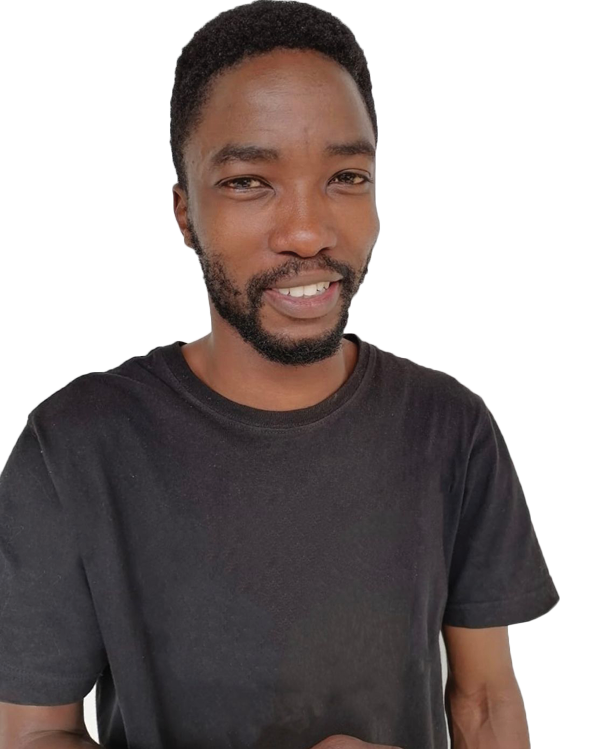
“We believe in the right to quality education for the African child. Through opportunities in creative industries, this sector will be a sustainable and powerful contributor to the African economy,” says Lungie Maphumulo from FAM.
Feenix was also launched in 2017 and works with all 26 public universities to ensure a future of debt-free education. Through crowdfunding, it has already disbursed over R76 million to 1 910 students’ university fee accounts.
“We believe that access to education should not be dependent on wealth. Our model connects communities, providing a tool for students to formalise their fundraising efforts and a channel for South Africans to find students that they wish to support,” says Feenix CEO Leana de Beer.
Jewellery design and manufacturing student Valentine Maketela is one of the students who have already benefited from the campaign.
“When I heard that my fees were outstanding, I didn’t know what to do. The bursary foundation, which was my only hope, stopped paying. By the grace of God, I got a job. It was not big, but I was grateful and saved every penny,” says Maketela. Sadly, his father got sick and passed away and Maketela had to use his savings to pay for the funeral. “I couldn’t believe it when I got the funding. I am grateful to be able to finish my studies on time, make my mark as a jeweller and make a difference in my community,” he says.
FAM aims to assist creative industry professionals to build lucrative and sustainable business models.
“A good place to start is ensuring they are able to study without worrying about student debt,” says Maphumulo.
To register for funding, students:
- Must be a South African citizen, registered at a South African public university.
- Must have current or historical debt.
- Must have a combined household income below R600 000 per year.
To register for or contribute to the fund, go to www.feenix.org
Dairy farm ploughs back
Dairy farm ploughs back UrsulaA successful North West dairy farm is helping others in the industry to get a foot in the door. 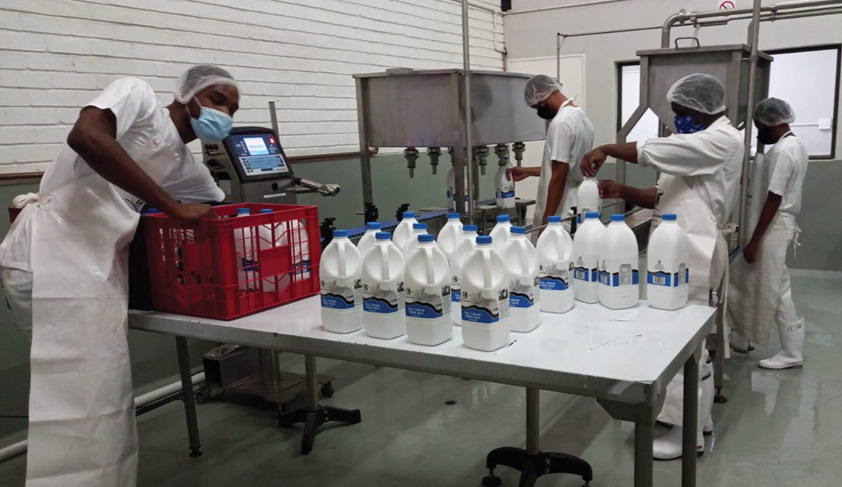
A father and son, who founded a 100% black-owned dairy business, want to give opportunities to small and emerging farmers in the milk production sector.
Stephen Mtimkulu and his son Nkosana are the founders of South Western Dairy, which is based in North West.
While the milk production industry is mainly in the hands of major producers, this does not mean that small farmers cannot enter the space, they say.
“We want to provide smallholder dairy farmers with a market for their milk. This will be done by listing these dairy farmers in our supply chain.
“It will provide opportunities for emerging dairy farmers to enter the milk industry and transform the sector,” says Nkosana.
The pair started their business in 2010, when Stephen acquired a farm in North West. They received start-up funding from the Department of Agriculture.
Nkosana says it has been a long journey, but they did not give up. Just after starting in 2010, a major milk processor promised to buy from them but, at the last minute, said their production capacity was too small and would not meet his targets.
“We decided to go to surrounding communities to sell pasteurised milk, amasi, yoghurt and feta cheese.”
The business now has seven permanent employees and has expanded to secondary milk processing.
It sources fresh milk from local dairy farmers and produces various dairy products.
Nkosana says their goal is for South Western Dairy to become a leading milk company in South Africa and add ultra-high temperature milk, powdered milk and baby formula to their product range.
He urges those in the same line of business, especially emerging milk producers, not to give up.
“As an entrepreneur, you need to persevere. Get advice from your nearest extension officers, state veterinarians, experts, cooperatives, YouTube and industry-leading bodies.
“Failure is not fatal or final, it is a great opportunity to learn, grow and advance your craft,” he says.
For more information, visit www.southwesterndairy.com
Disability no barrier to success
Disability no barrier to success UrsulaAfter a successful career as a swimmer, Sibusiso Mogale (30) has ventured into farming and urges people living with disabilities to follow their dreams just like he has. 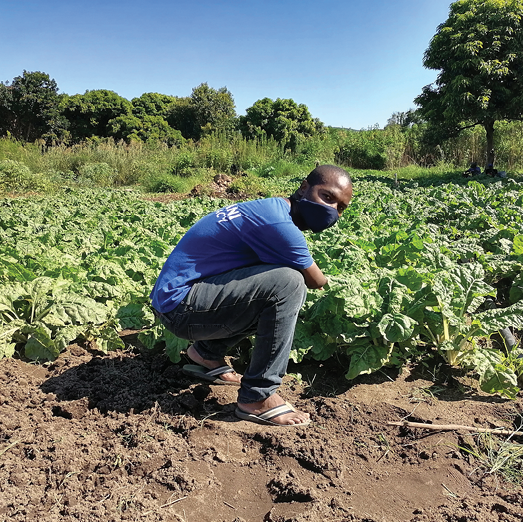
Mogale, from Mbombela in Mpumalanga, was born without hands. Despite this, he is active on three pieces of land where he does poultry and crop farming. Mogale is directly involved in the daily work together with his wife, uncle and brother-in-law.
“I produce vegetables, chickens and eggs. I officially started last year, but the idea and planning started in 2018. My dream was inspired by a love of agriculture and motivated by my late grandmother, who I learnt farming from,” he says.
Mogale has already produced tomatoes, spinach, cabbage, corn, lettuce, beetroot and onions, and sold these to consumers.
The father of one says despite his condition, as a child he always wanted to do what other people would not let him do. The more people said he could not do something, the more he would pursue it.
When Mogale returned to settle at home after representing South Africa at world swimming competitions, he realised there were many opportunities in farming.
“If you really want to get into farming then go for it. Your disability should not be a determining factor. You should never limit yourself based on your circumstances or disability,” he says.
Mogale appreciates the assistance he received from the Department of Agriculture, Land Reform and Rural Development (DALRRD).
“The department has done a great job in assisting me. Government does help and I have experienced this first hand.
“I am also supported by Mopani Pharmacy in Mbombela, which supports me not only because I have a disability, but because it loves my drive and motivation,” he says.
Through farming, Mogale has learnt patience and understanding. In addition to being patient, those aspiring to farm must have a hunger for knowledge and be creative, he says.
Mogale aims to become a commercial farmer, with his products distributed throughout the country.
Contact the DALRRD at 012 319 6000.
EVDS
EVDS vuyelwanRegistering to get vaccinated is easy!
Citizens aged 60years and above need to register for their COVID-19 vaccination
Connect device to the internet and go to: https://vaccine.enroll.health.gov.za
Dial *134*832IDNumber# No ID Number? Just dial *134*832#
Send the word REGISTER to 060 012 3456 on whatapp
Follow the instructions and enter all the information that is requested.
You will need your identification number (Passport, Asylum seeker number, RSA ID or refugee number)
Enter the location where you want to be vaccinated (home or work)
If you are a member of the medical aid you will need your medical aid provider name and your medical aid number
Elderly prioritised in vaccination drive
Elderly prioritised in vaccination drive vuyelwanPhase 2 of the country’s Coronavirus Disease (COVID-19) vaccination programme is underway, with citizens over the age of 60 receiving their vaccines from 17 May.
Eighty-seven vaccination sites across the country opened their doors to the elderly at the start of Phase 2.
Health Minister Dr Zweli Mkhize said the number of vaccination sites will increase as Phase 2 progresses.
He explained that government’s strategy to immunise citizens who are aged 60 and above, as part of the second phase, is due to the elderly being one of the most vulnerable groups who could become ill or die as a result of COVID-19. 
Religious leaders were among those who received their vaccines at the start of Phase 2.
Reverend Frank Chikane, the Senior Vice President of the South African Council of Churches (SACC), was vaccinated at the Esangweni Community Health Centre in Tembisa.
“We came here because we wanted to show the way
As leaders we wanted to show that vaccines don’t kill, they help you,” he said.
Chikane added that South Africans are no strangers to vaccines and that most people were vaccinated against various diseases as children.
“We all grew up with vaccines© When you went to school, you went with a card that showed which vaccines you took© and all of us are what we are because of vaccines. There’s no reason for people to fear vaccines. They are meant to help you.”
Protection for the vulnerable
Bishop Malusi Mpumlwana, the General Secretary of the SACC, encouraged South Africans to “embrace the gift of God in science”.
He added that vaccines are important if the country is to achieve population immunity, which will also protect the most vulnerable in society.
Government aims to inoculate five million senior citizens by the end of June, provided there is enough supply of vaccines.
South Africa’s vaccination programme currently uses the Johnson & Johnson (J&J) vaccine and Pfizer vaccine, but citizens cannot choose which vaccine they will receive at this stage.
The J&J vaccine only requires one dose, while the Pfizer vaccine requires two doses.
“When you get vaccinated you will be informed which vaccine you are getting, and if a second dose is needed,” explained Minister Mkhize.
He said people will receive the date, time and place of their second dose by SMS or on a card, which will be issued on the day of vaccination if a person does not have a phone.
“Most people will get their first and second doses at the same site.”
Pfizer vaccines are safe and work well, even against the variant that is dominant in the country.
“After 14 days, one starts to show markers of immunity. There is now very good literature to show that the interval between doses can be increased to six weeks and, in the United Kingdom, they showed good results after three months.”
Government is being advised by experts on the best interval between the doses.
Side effects
Many people have mild symptoms, after vaccination. These include flu-like symptoms like mild fever, headache, tiredness as well as redness, swelling and pain at the injection site.
However, these disappear within a day or two and can be managed at home with rest and paracetamol.
“If you have more serious symptoms such as severe headache, severe abdominal pain or severe limb pain you should phone our COVID-19 hotline, 0800 029 999, for advice or seek care at your local clinic or hospital,” said the Minister.
He urged citizens to register for their COVID-19 jab to protect themselves from becoming very sick or dying as a result of COVID-19.
“However, no vaccine works 100% and we also still do not know whether vaccination prevents transmission of the virus. It is therefore still important to follow the standard COVID-19 safety precautions to protect yourself and those around you.”
Sisonke Study
Minister Mkhize said 478 733 South Africans were vaccinated under the Sisonke Study that ended recently. This was Phase 1 of the vaccination programme.
Sisonke is a collaboration between various stakeholders, including the Department of Health, which allowed government to make the COVID-19 J&J vaccine immediately available to healthcare workers using a research programme.
The programme received 500 000 doses.
Leftover doses will not be used in the second and third phases of the vaccination programme.
The South African Medical Research Council will use these to conduct studies into how vaccines work for people living with HIV and other comorbidities, elite athletes, pregnant and lactating women, and other special groups.
Phase 1B of the vaccination programme started on 17 May, along with Phase 2. Phase 1B involves the vaccination of the remaining healthcare workers, traditional health practitioners and staff employed at funeral parlours.
Explore poultry farming opportunities
Explore poultry farming opportunities UrsulaYoung people looking to start a business should consider poultry farming. The industry is a growing one, with many opportunities and there is also much support from government. 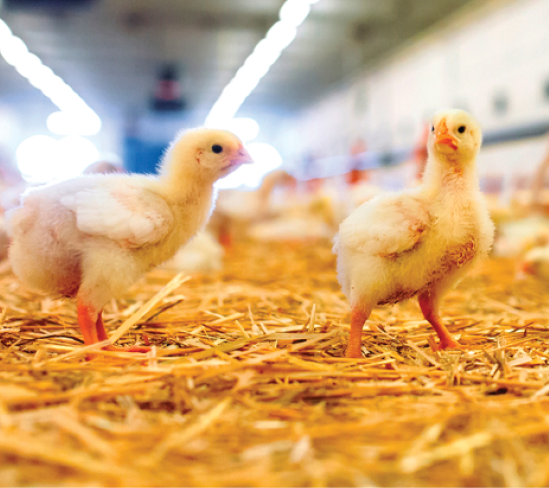
Senior researcher at the Department of Agriculture, Land Reform and Rural Development Dr Nkhane Baldwin Nengovhela says the poultry industry is one of the most advanced sectors in farming worldwide.
“I think all young people should consider it for farming. If you think of something called biotechnology, you can’t think of anything other than a day old chick that is raised for meat, or a layer that is raised to be able to lay an egg,” he says.
Nengovhela was speaking during a virtual Poultry Masterclass Webinar series that was hosted by government, in partnership with the South African Poultry Farmer's and Supplier's Association.
The masterclass is part of a series that Government Communication and Information System is hosting to promote entrepreneurship as a contributor to economic growth.
Emerging poultry farmer Mbali Nketsi, from Zuurbekom in Johannesburg, shared her experience of working in the sector.
She is the founder of Hen Home, which is run by farmers. The farm currently has 438 chickens producing eggs, which are being sold to local coffee shops. Residents also buy eggs directly from farmers.
Nketsi’s journey into poultry farming started last year during lockdown, when she found herself spending time on social media watching videos and stories shared by small-scale poultry farmers.
She came across a video in which Irene Farms and Poultry owner Nana Nene shared her expertise.
Nketsi reached out to Nene and pitched her idea of starting poultry farming and then received training from Nene.
After completing the training, Nketsi and her mother invested money to get a coop which cost around R15 000.
“We decided to start with 500 layers because I wanted a minimum of 10 trays [of eggs] to start per day because we didn’t know how the market was going to react.”
They started the business in their backyard, but neighbours started complaining about the noise and smell of the chickens.
The pair then rented a plot, where they started with chickens laying eggs at 18 weeks.
After their initial success, Nketsi has big dreams for the future.
“My dream is to play in the commercial space one day and have 5 000 to 10 000 chickens,” she says.
- SAnews.gov.za
Future farmers harvested at school level
Future farmers harvested at school level vuyelwanA government campaign is helping to grow interest in the agricultural sector in Eastern Cape schools.
School children in the Eastern Cape have been encouraged to take an interest in agriculture to help fight hunger.
Speaking at the launch of the School Food Gardens Campaign recently, Minister of Agriculture, Land Reform and Rural Development Thoko Didiza said communities should revive the practice of agriculture in schools and encourage young people to work the land.
As part of the campaign, cooperatives in Peddie, in the Eastern Cape, and two schools – Feni Primary School and Nathaniel Pamla High School – were given garden tools to support their agricultural work. 
Minister Didiza said the donation will encourage learners to become involved in agriculture and study agriculture further after matric.
“Family members of some of the learners are part of crop-producing initiatives in the community. Having unlimited access to gardening tools is going to help them perfect the art of working the land and producing their food.
“The schools will be able to produce vegetables and meet the state-subsidised nutrition programme,” she said.
Donation to impact lives
School governing body member at Nathaniel Pamla High School Nombulelo Saule said the donation will have a huge impact on the school.
“This is going to assist us as we will not need to go to the market to buy vegetables to cook for the children. We are going to plant at school and harvest there to take to the school kitchen.”
Yolisa Maramana, a learner at Nathaniel Pamla High School, who wants to study agriculture after matric, said while they are passionate about agriculture, the school’s limited resources were bad for their morale.
“The tools that we have been given will be of use to us because we are always in the garden. It’s been demotivating because some of the things we were taught in the classroom remained an unproven theory, but with the tools we received today, I believe a lot will change,” she said.
The cooperatives, which were given irrigation equipment, shovels, seedlings and wheelbarrows, grow vegetables and sell their produce to local markets.
Nobubele Mkoko from Zamukhanyo Project said the tools will help them maximise their business to help grow the Ngqushwa economy.
How to become a high-flyer
How to become a high-flyer UrsulaTransport Minister Fikile Mbalula has expressed concern that people from previously disadvantaged backgrounds are still a minority in the aviation sector. 
Addressing the National Aviation Conference recently, the Minister noted that statistics for the 2020/21 financial year showed little progress in transformation in the aviation sector.
He said Africans, coloureds and Indians represent 11% of licence holders, while white licence holders are much higher at 89%.
"This scenario needs to change. The statistics must reflect the racial demographics of the country.
“We must agree on transformation targets and introduce innovative measures to create access for young people who come from previously disadvantaged communities,” said the Minister.
With a shortage of aviation skills in South Africa and across the world, there is a great need for young people to enter the industry.
“In our case, we have seen many of our well-trained and experienced aviators being lured away from South Africa to jobs and opportunities in countries that are offering much better remuneration,” he said.
Pursuing a career in aviation does not necessarily mean becoming a pilot.
According to the South African Civil Aviation Authority (SACAA), aviation is a vast field which includes careers in piloting, various trades in engineering and mechanics, airport operations and the manufacturing of aircraft.
Due to the technical nature of most of the jobs, those with a strong background in mathematics, physical science and engineering can excel in the industry.
“Although the majority of opportunities require a foundation in science, technology, engineering and mathematics-related subjects, one can still launch a successful career in aviation, such as in aviation law, aviation safety and security and environmental management,” it says.
SACAA offers bursaries to future aviators in the areas of piloting, aeronautical engineering and maintenance engineering.
For more information on SACAA bursaries, visit www.caa.co.za or email: bursaryapplications@caa.co.za
You can also follow SACAA’s social media pages for updates on when bursary applications open.
Israel, Palestine urged to emulate SA by pursuing peace
Israel, Palestine urged to emulate SA by pursuing peace vuyelwan
Israel, Palestine urged to emulate SA by pursuing peace
Our experience with the democratic transition is a lesson about the power of empathy, negotiation and compromise.
The escalating situation in Israel and Palestine affirms once more what we South Africans know too well, that intractable conflicts can only be solved through peaceful negotiation.
It also demonstrates that unless the root causes of a conflict are addressed, in this case the illegal occupation by Israel of Palestinian land and the denial of the Palestinian people’s right to self-determination, there will never be peace.
The latest violence was sparked by an Israeli court decision to evict a group of families from their homes in the Sheikh Jarrah neighbourhood in East Jerusalem to make way for Israeli settlements.
The sight of men, women and children being evicted from the homes their families have lived in for generations brings back painful collective and personal memories for the majority of South Africans – of forced removals and land dispossession.
It was a pain and humiliation faced by my own family, and by many South African families. My family was forcibly moved to different parts of the country on two occasions.
Being forced from one’s home at gunpoint is a trauma not easily forgotten and is carried across generations.
As a country, we are still living with the residual effects of the callous acts carried out in the name of apartheid spatial planning.
For all who believe in equality, justice and human rights, we cannot but be moved and indeed angered, at the pain and humiliation being inflicted on the Palestinian people; for it echoes our own.
Israel’s actions are a violation of international law. They show a total disregard for successive United Nations Security Council resolutions that call for an end to the occupation of Palestinian land and for the fulfilment of the rights of the Palestinian people.
Since Israeli security forces launched assaults on worshippers at Al-Aqsa Mosque in Jerusalem, the violence has now engulfed the Gaza Strip, large parts of the West Bank and a number of Israeli cities. It has claimed the lives of dozens of people, including children.
It is also deeply troubling that Israeli forces destroyed a multi-storey building that housed a number of media organisations, sending a chilling message to media reporting on the violence.
The senseless and continued Israeli bombardment of Gaza will have devastating consequences for more than two million people who have been suffering under an illegal Israeli blockade for 14 years.
We call on all parties involved to show restraint, to respect human life and to cease the current hostilities.
As South Africa, we are committed to being part of international efforts aimed at reviving a political process that will lead to the establishment of a viable Palestinian state existing side-by-side in peace with Israel and within internationally recognised borders.
The two-state solution remains the most viable option for the peoples of Israel and Palestine and must continue to be supported.
Just as Israeli security forces were attacking worshippers at the Al-Aqsa Mosque, we in South Africa were preparing to commemorate the centenary of the Bulhoek Massacre at a religious site in Ntabelanga in the Eastern Cape.
On 24 May 1921, colonial security forces armed with machine guns and artillery opened fire on worshippers, killing more than 160 people and wounding nearly 130.
The massacre laid bare the brutality not only of the police force of the Union of South Africa, but also the racist system that it was charged to uphold.
Just like the dispute in the Sheik Jarrah neighbourhood, the atrocity at Bulhoek was not just about a local dispute; it was fundamentally about the forced dispossession of land, about colonial occupation, about racial discrimination and about the violent suppression of dissent.
As we reflect on the crisis in the Middle East and particularly on the suffering of the Palestinian people, we would do well to recall the words of Selby Msimang, a founding member of the African National Congress.
In the aftermath of the Bulhoek massacre he wrote: “History has shown that the human soul naturally revolts against injustice”.
The protests and the revolt of the oppressed people of South Africa against colonialism and apartheid proved the veracity of this prophecy.
As lovers of freedom and of justice, we stand with the Palestinian people in their quest for self-determination, but also in their resistance against the deprivation of their human rights and the denial of their dignity.
As citizens of a country that was able to turn its back on race-hatred and bloodshed, and build an inclusive society rooted in human rights for all, it is our collective hope that the people of Israel and Palestine will follow a similar path; that they will find each other and that they will find peace.
Living with vitiligo
Living with vitiligo UrsulaOtshepeng Mmutloane (20) is constantly stared at by strangers. It is one of challenges she has to deal with as a result of being diagnosed with vitiligo when she was four. 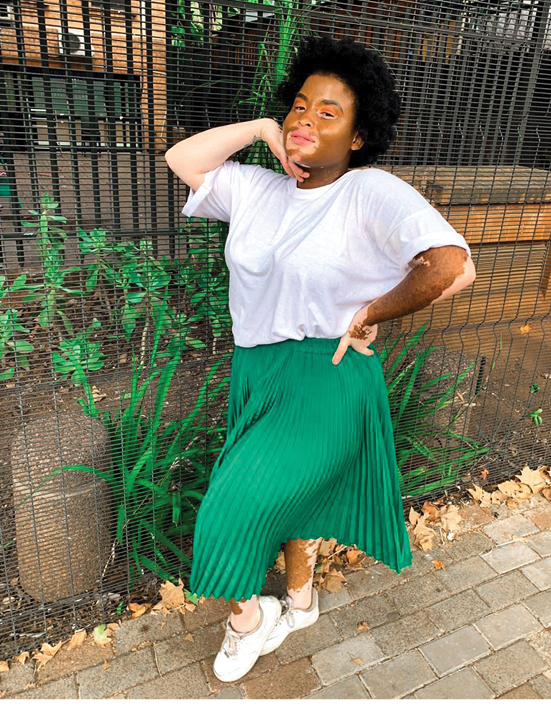
With World Vitiligo Day commemorated annually on 25 June to generate awareness around the disease, Vuk’uzenzele spoke to Mmutloane about what it is like to live with the condition.
Vitiligo is an autoimmune disease in which melanocytes (pigment producing cells) stop producing pigment, which leads to white spots on the skin and hair.
According to the Vitiligo Society of South Africa (VSSA), the condition only affects 1% of the world’s population. It is not curable, although many treatments are available.
Mmutloane’s vitiligo was initially only visible around her mouth, but gradually started moving to other areas on her body. She says that while living with the condition has its challenges, she is no different than anyone else.
“People always assume that I have tales to tell, but I don't. There is obviously something different in my appearance, compared to other black women, but all black women are different in their own way,” she says.
Mmutloane adds that she is often subjected to offensive comments and behaviour because of her condition.
“The hardest part is dealing with stares. Having to constantly explain to people why you look a certain why can be exhausting. Teaching children about the disease is one thing, but having to reprimand adults for being rude or offensive is the hardest to handle.”
Tshwane-based dermatologist Dr Chantelle Doman says people have misconceptions about vitiligo.
“There are myths about the disease, such as it being contagious; caused by cancer; eating certain foods, such as fish; caused by doing something wrong or a sin; affects certain races only; and that people with vitiligo are intellectually or physically impaired. All of these are not true,” she says.
About 30% of vitiligo patients have a relative that is affected by the disease. “This is due to multiple genetic factors,” explains Dr Doman.
Mmutloane says it is important for people to be educated about the disease.
“I believe that educating people about vitiligo could decrease incidents where strangers project their feelings, opinions and beliefs onto others. We often come across people that are influenced by the opinions of others and myths, without understanding a condition,” she says.
For more information, visit VSSA’s website at www.vitiligosocietysa.com or call 031 265 1505.
Meet KNP’s first female head ranger
Meet KNP’s first female head ranger UrsulaThe Kruger National Park (KNP) has made history by appointing its first female head ranger. 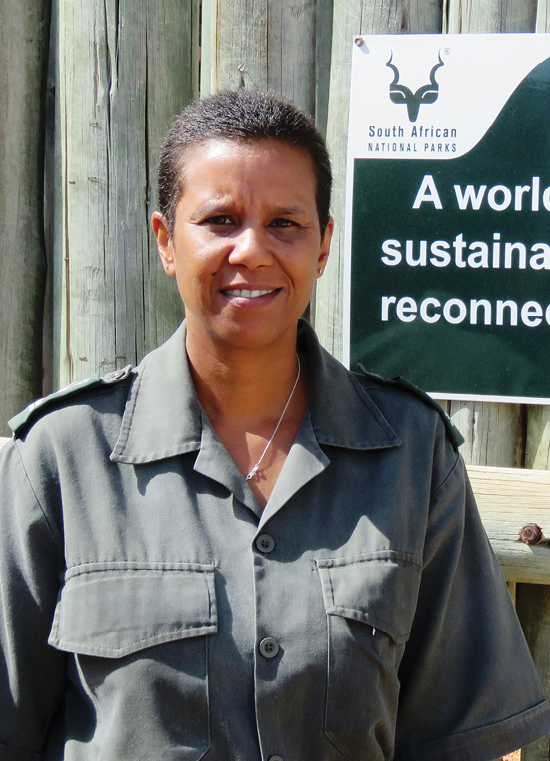
Cathy Dreyer took up the role on 1 May.
For Dreyer, being the first female head ranger is all about hard work and commitment.
“Some of the most committed, ethical and dedicated conservationists I have met are men and women. It really is about the individual’s character – it all comes down to integrity, fairness and a passion for what you do,” she says.
Dreyer hopes her appointment will inspire others.
“Massive strides have already been made by women across all spheres of life and I hope my appointment will further prove that one should never place any limitations on oneself.
“There isn’t anything that cannot be achieved through hard work, dedication and the right people supporting you,” she says.
Dreyer’s passion for wildlife is mostly driven by a need to make a difference and meaningful contribution to conservation.
“This extends further than wildlife, it also extends to the people who dedicate their lives to protecting our national heritage. It is an incredible privilege to be the head ranger of KNP.”
Dreyer’s appointment came after KNP’s recent strategy session to prepare a Rhino Implementation Plan to address the decline of rhino in the park.
“I think the biggest challenge will be balancing the security and conservation functions and the demand they place on the ranger corps,” she says.
Dreyer adds that it is important to ensure that the men and women who dedicate their lives to protecting our wild places and wildlife receive the support they deserve.
“I am looking forward to working with the team to address these issues and make a meaningful contribution to rhino conservation and the rangers.”
Gareth Coleman, KNP’s Managing Executive, says Dreyer is highly experienced in conservation management and conserving rhinos in particular.
“We know she will bring new energy, ideas and passion to our dedicated team,” he adds.
Dreyer was previously the Conservation Manager at Addo Elephant National Park in the Eastern Cape and before that she was based at the KNP where she contributed to the protection and conservation of black rhino.
Men and boys fight GBVF through dialogue
Men and boys fight GBVF through dialogue vuyelwanMen and boys need to have conversations about gender and behaviour to make progress in the fight against gender-based violence and femicide (GBVF).
One initiative to encourage these conversations is the Under-the-Tree Dialogue, a programme spearheaded by the Department of Justice and Constitutional Development (DoJCD).
Recently, the department held the dialogue in Mogale City in Gauteng, where about 100 men and various representatives from non-profit organisations and the municipality were invited.
The department’s Gauteng Regional Head, Tsietsi Malema, says the dialogue aims to engage men and boys about what needs to be done to end GBVF. 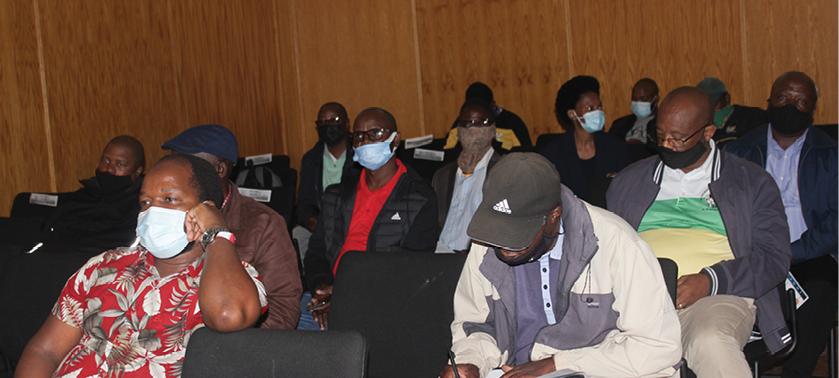
“The dialogue uses traditional law courts or community councils, also known as makgotla in Setswana.
“Although we do not necessarily sit under a tree, we target spaces where men and boys are likely to gather or invite them under one roof where they can have important conversations about GBVF,” he explains.
These dialogues create a non-intimidating space to introspect and face up to the harmful realities and effects of GBVF.
“We also aim to correct wrongful perceptions and actions that men and boys have towards women and girls.
“We are trying to promote equal rights and encourage men to actively put an end to GBVF.”
Malema says gender stereotypes and roles are some of the issues mentioned in the dialogues, as these contribute to GBVF.
The founder and president of Not In My Name International, Siyabulela Jentile (29), was one of those who participated in the Under-the-Tree Dialogue.
The #NotInMyName campaign was established after Karabo Mokoena was killed by her boyfriend in 2017.
What stood out for him during the dialogue was the transparency and conviction with which most men spoke.
“They spoke their hearts and minds. Even though one wouldn’t necessarily agree with some of their sentiments, it was inspiring to see men showing emotion. It shows we are getting somewhere. Change is in motion,” he says.
For more information, contact the DoJCD at 012 315 1111.
New oncology unit for Witbank Tertiary Hospital
New oncology unit for Witbank Tertiary Hospital UrsulaCancer patients from Mpumalanga will no longer have to cross provincial borders to access cancer treatment and healthcare, as a new oncology unit has been opened at Witbank Tertiary Hospital. 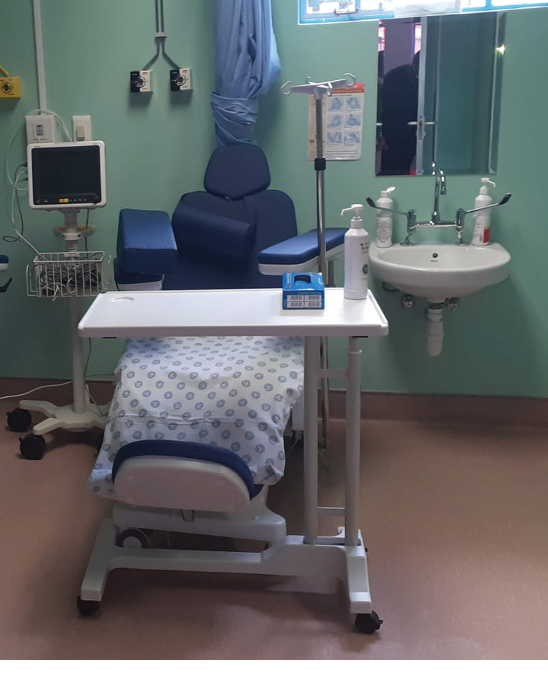
According to the Mpumalanga Department of Health, about 500 cancer patients from the province used to travel to Steve Biko Academic Hospital in Tshwane to receive cancer care services.
The new oncology unit will provide screening, radiological, histological and cytological diagnosis services.
The unit can also carry out chemotherapy and surgery such as mastectomy. Plans are in place for the unit to also offer radiotherapy in the future.
Multi-disciplinary medical teams have been established in the unit to ensure that identified cancers are treated jointly by specialists.
The new oncology unit was officially opened by Mpumalanga Premier Refilwe Mtshweni-Tsipane and Health MEC Sasekani Manzini recently.
The Premier praised the exceptional work done by the department and staff from the University of the Witwatersrand.
“The two institutions signed a Memorandum of Understanding to work together to improve access to specialised healthcare services for the people of Mpumalanga and to decrease cancer patients’ waiting times. Their commitment and teamwork made it possible for us to achieve this important milestone,” she said.
The new oncology unit is part of the provincial government’s effort to provide cancer care services and improve access to healthcare for local residents.
In the past, the department identified a need for an oncology treatment centre, offering chemotherapy services.
This led to oncology services being launched at Rob Ferreira Hospital, in Mbombela, in August 2019.
If you or a loved one has been diagnosed with cancer, contact the Cancer Association of South Africa (CANSA). It has online support groups to help you. For more information, call the toll-free Help Desk at 0800 22 66 22, or visit www.cansa.org.za
CANSA also offers multilingual support on WhatsApp: 0721979305 for English and Afrikaans, and 0718673530 for isiXhosa, isiZulu, Sesotho and Siswati.
Olympic contender’s masterstroke
Olympic contender’s masterstroke UrsulaHard work and perseverance have paid off for a teenage swimmer who has made it into the South African Olympic team. 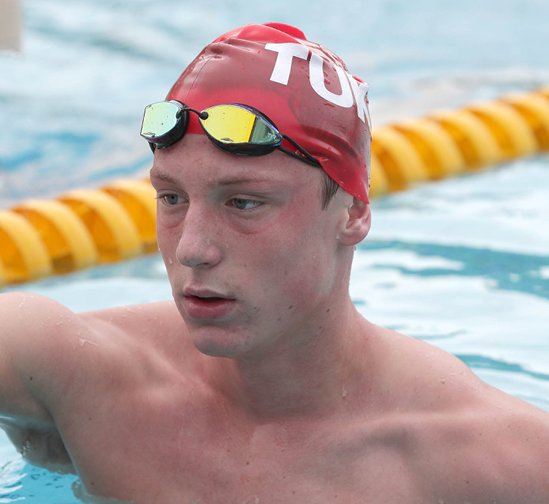
Pieter Coetzé (16) has qualified to compete as a senior swimmer in the 100-metre backstroke at the Olympic Games in Tokyo, Japan.
Coetzé, from Tshwane, qualified after winning his race during the SA Invitational Aquatic Championships in Gqeberha last month.
He is the first junior in South Africa to qualify for a senior swimming team. Well-known swimmers Chad le Clos and Cameron van der Burgh were 20 when they did so.
A Grade 11 scholar at Cornwall Hill College in Centurion, Coetzé says he was not an avid swimmer at first.
“I started swimming when I was nine. As I got older, I grew fond of the sport. I soon realised that the harder I trained, the better I became. This became a great motivator as I liked seeing the results that came with harder training.”
After participating in numerous galas and winning, Coetzé soon realised that the dream to become part of the South African Olympic team was not so far-fetched.
Seeing the vast potential their son possessed, Coetze’s parents advised him to get professional coaching.
He is now part of TuksSwimming at the University of Pretoria, under the wing of internationally renowned coach Rocco Meiring.
“Honestly, I have been training all my life for this moment, but in 2019 the #RoadToTokyo started becoming a reality when I started making some big time drops in my races. It really started looking attainable to be part of the next Olympicteam,” says Coetzé.
The road to his dream has not always been smooth, as he missed the chance to qualify for the games five times – twice in the 200-metre backstroke and three times in the 100-metre backstroke.
Juggling school and practice has also been hard. “My family helps me not to lose track of what is important, because there is life after swimming. I need something to fall back on. The school has also been very helpful,” he says.
As Coetzé prepares for the Olympics, he says his long-term ambition is to be one of the best.
“I definitely want to be a medallist at the Olympics one day. I also want to be one of the top swimmers in the world.”
The Olympic Games takes place from 23 July to 8 August.
Parys youth savour the smell of success
Parys youth savour the smell of success UrsulaA youth-owned business is making a success of its rose garden. 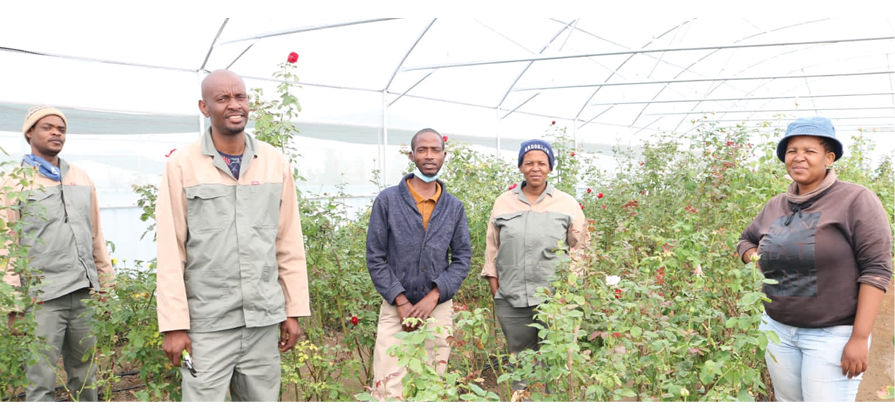
Roses do not bloom quickly, they take time to blossom and grab attention with their beauty and natural perfume.
And just like the roses they grow, it has taken time for five young people from Parys in the Free State to make their project a success.
They have established a rose garden under the name Women Empowerment Project.
The project was established about five years ago by seven young women to provide them with an income through local sales and to supply roses to the annual Madeira Flower Festival in Parys.
The festival showcases the beauty of flowers and their role in the environment.
Unfortunately, some of the co-founders left the project before it could become a success. They were replaced by other young men and women.
Refilwe Malebo (33) joined the business in 2017 to assist her sister.
“We specialise in a variety of roses, including Belle Rouge, Intense, Free and Loyal, Lesotho Prince and Fifty Shades of Grey. All of them are petalled differently, with different colours and natural perfumes,” explains Malebo.
The project uses two tunnels, 30mx10m in size, to plant and grow the roses.
In 2020, the project received support from the Mpumalanga Department of Agriculture, Rural Development, Land and Environmental Affairs to improve it operations.
“We received funding worth R1.5 million, which we used to revamp our tunnels. Initially our tunnels were covered in plastic, but over the years it got torn and worn-out and direct sunlight badly affected our products. We replaced the plastic with poly carbon and added one new tunnel.”
Malebo adds that the funding was also used to improve security by building an electric fence; renovate the cold room, which is used to store roses once they are cut; and install an irrigation system and 18 solar panels.
The youth-owned business sells the roses to locals in Parys and also has a fixed-market contract with a florist that supplies companies in Johannesburg.
“We also sell the roses to restaurants, funeral parlours and event organisers,” she says.
For more information about funding from the department, contact 051 861 8515.
Protect children from cyberbullying
Protect children from cyberbullying vuyelwanCSIR experts use technology to try and eliminate cyberbullying.
The cruelty and devastating effects of cyberbullying on children have been laid bare in recent months.
In a recent case of cyberbullying, Grade 10 learner Lufuno Mavhunga, from Mbilwi Secondary School in Limpopo, died by suicide after being beaten by another learner. Mavhunga overdosed on prescription pills after the video of the beating was shared on social media.
Cyber security experts from the Council for Scientific and Industrial Research (CSIR) say cyberbullying is extremely harmful to children and can lead to depression, sadness, anger, frustration, anxiety and fear.
“It can also lead to low self-esteem, delinquency, school violence, family problems and suicidal thoughts,” explains CSIR senior researcher Sipho Ngobeni.
Cyberbullying occurs when someone uses electronic communication to intentionally harass, threaten, embarrass, intimidate, stalk, humiliate or make fun of another person.
Ngobeni says research shows that 41% of children develop social anxiety after experiencing cyberbullying, 37% develop depression, 26% have suicidal thoughts and 25% engage in self-harm.
“These findings show that cyberbullying is a serious issue... Getting everyone involved – youth, parents, educators, law enforcement and social media companies – is the key to dealing with this problem,” he adds.
Most cyberbullying, 42%, occurs on Instagram, 31% on Facebook, 31% on Snapchat, 12% on WhatsApp, 10% on YouTube and 9% on Twitter.
CSIR expert Rofhiwa Netshiya says there is a need for public education about all forms of cyberbullying.
“We need to educate children that cyberbullying can lead to serious consequences,” she says.
To tackle cyberbullying, the CSIR team is working on a platform that detects bullying in chatrooms.
“The platform will automatically detect cyberbullying on chat groups and block users who continue to send hate speech. It will give the user three warning messages and, if they persist, it will block them,” says Netshiya.
She advises parents to install basic internet monitoring software on their children's devices to monitor their activities.
“There are low-cost products that can invisibly monitor the activities of your kids and privately email you the results as often as you like. These are very important to track internet sites visited, downloads, chatroom conversations and instant messaging.”
The CSIR offers the following tips for parents who suspect their children are victims of cyberbullying:
- Ensure the child feels safe, show unconditional support.
- Work with your child to arrive at a course of action that you both agree on.
- Discuss the cyberbullying matter with the relevant school.
- Contact parents of the aggressor to investigate the matter and remove offending material.
- Report the issue to police in the case of physical threats or extortion, stalking, blackmail and the sexual exploitation of minors.
- Educate your child about appropriate online behaviour.
- Reinforce positive morals and values.
For help on cyberbullying, call Childline at 080 005 5555 or Lifeline at 011 728 1347
Register for COVID-19 vaccine
Register for COVID-19 vaccine vuyelwanHealth Minister Dr Zweli Mkhize has urged the elderly to sign up for their Coronavirus Disease (COVID-19) vaccine.
South Africans do not need airtime, data or money to use the zero-rated services to register on the Electronic Vaccination Data System (EVDS).
There are five ways to register on the EVDS:
- Online at vaccine.enroll.gov.za.
- Using the WhatsApp line: 0600 123456.
- Via SMS by dialling *134*832#.
- Calling the COVID-19 hotline: 0800 029 999.
- Using the new QR code, by simply scanning and following the prompts.
Minister Mkhize said the national Department of Health, provincial department and Government Communication and Information System teams are conducting registration drives. 
“We recommend that as many people as possible register beforehand,” Minister Mkhize said, noting that vaccination centres are currently not allowing walk-ins.
“However, going forward, we will be able to do so. The programme has been designed to avoid long queues. This is why it is important that as many people as possible register beforehand, and follow the instructions which they receive by SMS.”
Old-age homes
Citizens living in old-age homes will not receive an SMS because the vaccines will be brought to them.
“They will be registered and vaccinated at their old-age homes.”
The Minister added that if you miss your vaccine appointment for any reason, you can reschedule and will be given another date and time to be vaccinated.
However, he warned that if a person misses three appointments, their appointment will not be rescheduled.
“However, you will still be on the system, and can ask to be scheduled again by phoning the COVID-19 hotline or visiting a registration site.”
COVID-19 vaccines are free at the point of vaccination. The costs of the vaccine are covered from public funds for uninsured people and medical aids for those who are insured, as part of prescribed minimum benefits.
– SAnews.gov.za
Register to vote in the Local Government Elections
Register to vote in the Local Government Elections vuyelwanVoting stations across the country open on 17 and 18 July 2021 to allow eligible South Africans to register to vote in the upcoming Local Government Elections.
Existing voters will also have the opportunity to check their registration details and update these, if necessary.
The Local Government Elections will take place on 27 October 2021.
According to the Independent Electoral Commission (IEC), all 23 146 voting stations will open from 8am to 5pm on 17 and 18 July. This will be the only opportunity for voters to register and check their registration status at their voting stations.
“However, ongoing voter registration will continue during working hours at local IEC offices until the proclamation of the elections,” it said. 
Registered voters will still be able to amend their registration details through the 'Click, Check, Confirm' functionality on the IEC’s website.
To register as a voter, citizens must be at least 16 years old and be in possession of a valid South African ID document – either a green barcoded ID book or a smartcard ID.
“Voters are reminded that they must be registered at a voting station in the ward in which they are ordinarily resident and must provide an address or detailed description of a place of residence. However, proof of address (e.g. in the form of a utilities account) is not required for registration.”
The IEC said anyone visiting a voting station should wear a mask or appropriate face covering and observe social distancing.
Hand sanitising facilities and stationery will be provided at each voting station.
Eligible voters can find out more about where, when and how to register by visiting the IEC’s website at www.elections.org.za
Existing voters can check their current registration details on the website or by SMSing their ID number to 32810 (at a cost of R1).
The IEC urges South Africans, particularly those who are eligible to vote for the first time, to use the one-and-only registration weekend or the online portal to prepare to vote in October this year.
“Voters who have moved house since the last election as well as those with incorrect, incomplete or missing addresses are especially urged to update their details,” said the IEC.
– SAnews.gov.za
Rural and township businesses go digital
Rural and township businesses go digital UrsulaSmartXchange is digitising businesses to help rural and township entrepreneurs and their clients connect more easily. 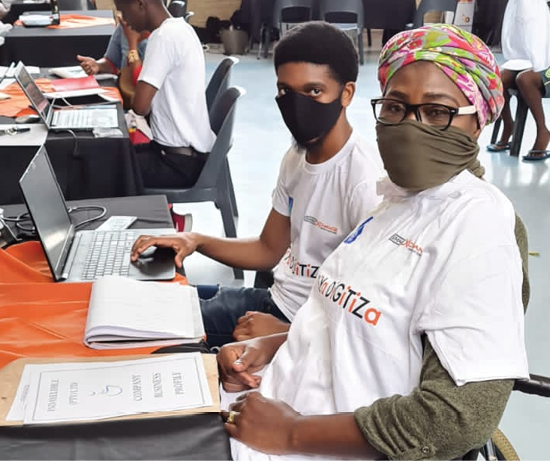
Chief Executive Officer of SmartXchange Jonathan Naidoo says during the Coronavirus Disease lockdown, township businesses were unable to operate, but their counterparts in urban areas continued with online sales and reliable internet connectivity.
“As the impact on township businesses became more obvious, it was clear that the lack of participation in a digital economy was the crippling factor that contributed to the inability to trade, deliver and market products and services,” he says.
Naidoo and his team of young innovators put together the SiYaDiGiTiZa project to enhance the visibility of small businesses on an online platform, enabling them to trade, grow and become financially stronger.
“The project will bridge the gap between the township, rural and urban divide and will play a pivotal role in sustaining the historically marginalised township and rural economies.
“There is a need to reach out to more township and rural enterprises as there is a clear demand for the technological offerings of the project,” he says.
Praise Khumalo, the owner of SMEPlus which leads the listing of businesses into the directory, says it has already digitised over 2 000 businesses from the townships of Phoenix, Inanda, Ntuzuma, and KwaMashu. It is now in its second phase and is targeting 5 000 businesses.
“We are focusing on these four townships before we move to others. We set up appointments and also go to entrepreneurs, based on their availability. After we have visited most townships, our registration will be based purely online,” he explains.
What SiYaDiGiTiZa does
SMEPlus and Tag Your Delivery consult with small, medium and micro enterprises (SMMEs) to check their compliance and assess their business processes. Following the consultation, they are listed on the Digital Business Directory and offered a Business Management App to help them run their business smoothly.
The directory delists all non-compliant and inactive SMMEs to ensure buyers meet credible businesses on the app. Customers are also allowed to rate the quality of their services and products.
The project is supported by local media companies that provide online marketing exposure and internet for the digitised businesses.
Naidoo says he hopes the project will serve as a model that can be expanded to every township and rural area in South Africa.
To list your business with SiYaDiGiTiZa, email praise@focalsoft.co.za or call 082 756 8442.
Sanitiser dispenser for people with disabilities
Sanitiser dispenser for people with disabilities UrsulaSanitiser dispenser for people with disabilities 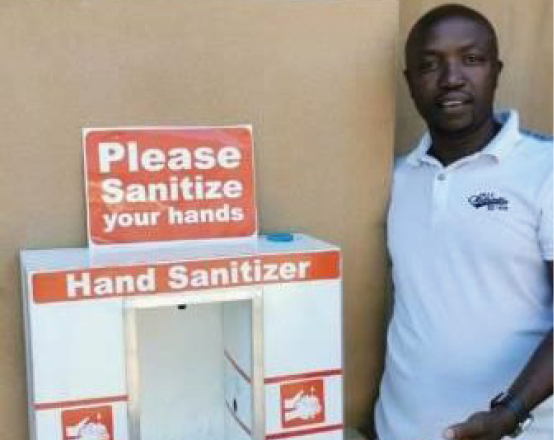
A Limpopo businessman has made it easier for people with disabilities to sanitise their hands.
The need to create an affordable, automatic hand sanitising dispenser for people with disabilities inspired Limpopo boilermaker Ezekiel Moimane (45) to design and manufacture one.
It was during the national lockdown that Moimane, from Phalaborwa in Limpopo, realised that many people in his rural area struggled to use the widely available pedal sanitiser dispensers.
These dispensers were not user-friendly, especially for those in wheelchairs.
Moimane decided to do something about this by designing and manufacturing an automatic sanitiser dispenser that is better suited for people with disabilities.
“They just have to put their hands below the nozzle and the sensor will detect them.
“It then automatically dispenses hand sanitiser. One can place it at the entrance of their workplace, shop or home. It can sanitise 650 pairs of hands,” he explains.
While there are sanitiser dispensers like the one Moimane designed in the country, he says they are expensive and not readily available in rural areas.
“I used stainless steel, mild steel and other related materials to manufacture the device. This makes it cheaper to make and cheaper to sell,” he adds.
Moimane’s dispenser has a 1.3-litre switch tank that holds the sanitiser and a 220-volt back-up battery that can last for seven hours without electricity. The pump nozzle can be adjusted to disperse between 2ml and 10ml of sanitiser at a time.
Moimane says he completed the project through self-knowledge and determination.
“I completed matric at Tshabelang Dinoko High School and furthered my studies to become a boilermaker at Ekurhuleni Academy in 2008. I then established my own company, Let Him Decide. Now I am the founder of this important hand sanitising dispenser,” he says.
Moimane plans to donate some of the dispensers to disability centres and old- age homes in his area.
“We all need to play our part in fighting the spread of the Coronavirus Disease. I know it may not seem like much, but I will be happy to be among those who contributed,” he says.
Siphelele's sauce of success
Siphelele's sauce of success vuyelwanAn East London youth has gone from selling food on the pavement to running a successful sauce business.
Siphelele Zekani (29) is the proud owner of 043 Sweet Garlic Sauce, which supplies numerous Spar stores in East London.
Originally from Idutywa in the Eastern Cape, Zekani has had a passion for cooking since high school.
“While studying forestry at the University of Fort Hare, I continued to enjoy cooking and decided in 2017 to turn my hobby into something I could earn money from,” he says. 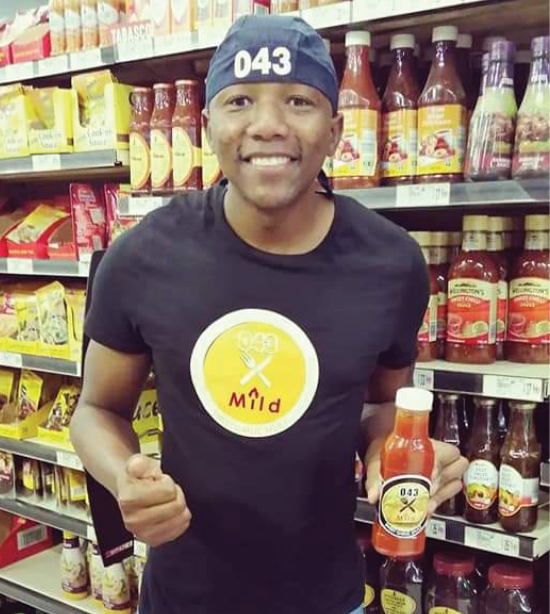
Zekani started selling street food, but soon came up with an idea to create a unique sauce.
“I was selling hotdogs, sausage rolls and wings on the streets, but wanted something that would make my food stand out. I started searching the internet for exotic sauce flavours,” he says.
Zekani was drawn to garlic and started refining the taste.
“I mix the ingredients, cook it on table boilers, blend it to remove lumps and package it into 375ml bottles with stickers on them.”
His one challenge was preserving the sauce.
“I did not know what chemical to use to keep the shelf life, until I put more effort into online research.”
Zekani supplies five Spar outlets with his garlic sauce.
“My sauce manufacturing is still quite traditional, hence I am only supplying five stores. My production capacity is in infancy, but I plan to have a nationwide distribution link and to also export overseas.
“I also want to establish standalone sauce shops in a number of towns across the country. This will double as a marketing tool.”
Spar Idutywa’s store manager Bonginkosi Ntangashe says the sauce is selling quite well. “Every week we place a new order because of how fast it goes off the shelves. I think customers recognise it and the price is affordable.”
Zekani has hired three people who help him with the manufacturing process and three merchandisers who work shifts.
He has also started making mint sauce, but it is still in production and not yet in retail stores.
Training boosts Mbombela business
Training boosts Mbombela business vuyelwanYouth training has assisted an entrepreneur to grow his business using online marketing and other channels.
A technology devices repairman is putting the training he received from the National Electronic Media Institute of South Africa (Nemisa) to good use by exploring new growth avenues for his small shop.
Nick Ndlovu (35), the owner of iRepair Technologies in Mbombela, Mpumalanga, recently benefited from the training and is now passing on his new acquired skills to others.
“I was trained in opening and replacing the hardware components of cellphones, tablets and laptops. I am now teaching my employees so that I can offer a full service to my clients,” he says. 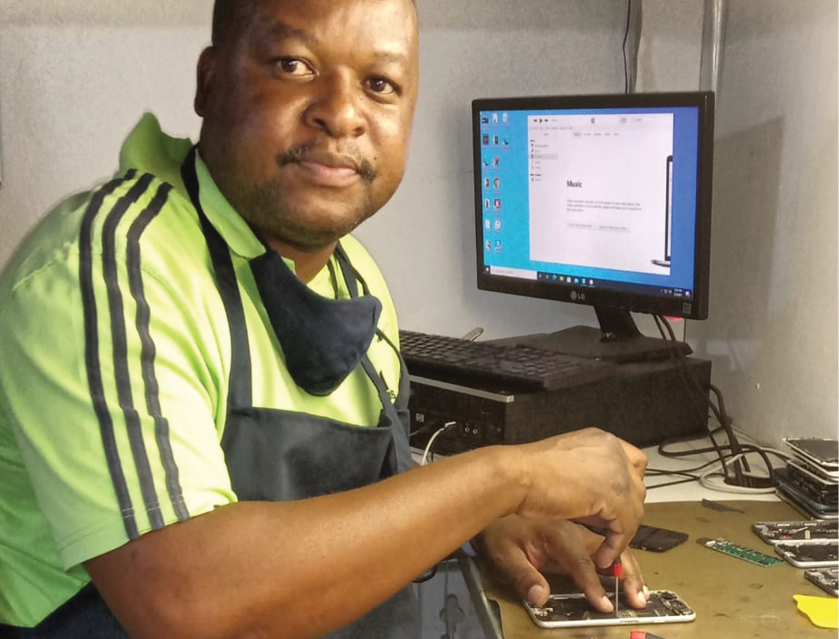
Nemisa, an entity of the Department of Communications and Digital Technologies, also trains young people in business management.
During the training course, Ndlovu learnt how to improve his business prospects through marketing and the use of the internet, websites, cloud storage, social media, blogging, email and messaging.
“The course aims to develop informed and skilled participants, who can apply the acquired skills in any industry,” he says.
While Ndlovu’s business is no stranger to those who live in the area, he now has dreams of expanding.
“My business is quite well-known among the residents of Mbombela, but the training taught me how to attract a bigger clientele. I have already started implementing these marketing strategies in my business and I can see the difference,” he adds.
The Small Enterprise Development Agency (Seda) helped Ndlovu to get into the training course.
This is not the first time that Seda has helped him grow the shop’s services. When he opened the store in 2017, Seda helped him to brand and market the business to local clients.
Nemisa is running several training courses for young people, including digital literacy, graphic design, interactive media, radio production, animation and film and television. It is also running a hackathon programme that helps to develop the trainees’ software and development skills.
For more information about Nemisa raining, visit www.nemisa.co.za.
For more information on Seda, call 012 441 1000.